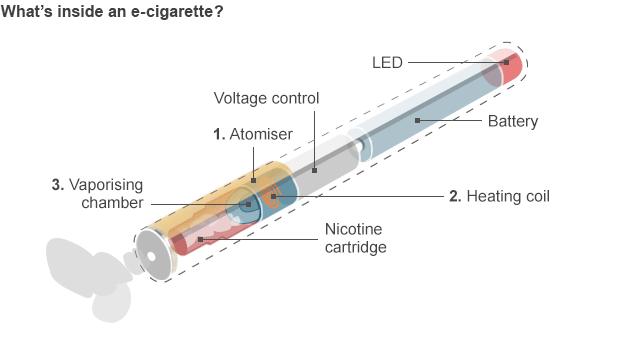E-cigarettes 'less harmful' than cigarettes
- Published

Researchers say national policies need to be made once all evidence is reviewed
E-cigarettes are likely to be much less harmful than conventional cigarettes, an analysis of current scientific research suggests.
Scientists argue replacing conventional cigarettes with electronic ones could reduce smoking-related deaths even though long-term effects are unknown.
In the journal Addiction, researchers suggest e-cigarettes should face less stringent regulations than tobacco.
But experts warn encouraging their use without robust evidence is "reckless".
Instead of inhaling tobacco smoke, e-cigarette users breathe in vaporised liquid nicotine.
About two million people use electronic cigarettes in the UK, and their popularity is growing worldwide.
'Fewer toxins'
The World Health Organization and national authorities are considering policies to restrict their sales, advertising and use.
An international team examined 81 studies, looking at:
safety concerns
chemicals in the liquids and vapours
use among smokers and non-smokers
Scientists say risks to users and passive bystanders are far less than those posed by cigarette smoke, but caution that the effects on people with respiratory conditions are not fully understood
And they say electronic cigarettes contain a few of the toxins seen in tobacco smoke, but at much lower levels.
They report there is no current evidence that children move from experimenting with e-cigarettes to regular use, and conclude the products do not encourage young people to go on to conventional smoking habits.
And their analysis suggests switching to e-cigarettes can help tobacco smokers quit or reduce cigarette consumption.

Prof Peter Hajek, of Queen Mary University in London, an author on the paper, told the BBC: "This is not the final list of risks, others may emerge.
"But regulators need to be mindful of crippling the e-cigarette market and by doing so failing to give smokers access to these safer products that could save their lives.
"If harsh regulations are put in place now, we will damage public health on a big scale."
Researchers conclude there should be more long-term studies comparing the health of smokers with e-cigarette users.
'Proportionate regulations'
Prof Martin McKee, of the London School of Hygiene and Tropical Medicine, who was not involved in this analysis, told the BBC: "Health professionals are deeply divided on e-cigarettes.
"Those who treat smokers with severe nicotine addiction see them as offering a safer alternative to cigarettes.
"In marked contrast, many others, such as the 129 health experts who recently wrote to the World Health Organization, are extremely worried given the serious concerns that remain about their safety, the absence of evidence that they help smokers quit, and the way they are being exploited by the tobacco industry to target children.
"This report concedes there are huge gaps in our knowledge - yet, incredibly, encourages use of these products. This seems little short of reckless."
Martin Dockrell, at Public Health England, said: "Increasing numbers of smokers are turning to these devices as an aid to quitting and there is emerging evidence that they are effective for this purpose.
"In order to maximise the benefits to public health while managing the risks, regulation of e-cigarettes needs to be proportionate and designed to ensure the availability of safe and effective products, and to prevent the marketing of e-cigarettes to young people and non-smokers."
- Published28 April 2014

- Published12 November 2013
